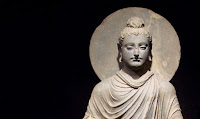 |
| Science's "space photos" are all fake, Photoshopped pieces of fanciful art (7-themes.com) |
 |
| Maya, the Mirror of Illusions, painting by American artist Arthur Bowen Davies (1910) |
 |
| Our world is illusory and unreal. |
It is an illusion (maya). This world is quite unreal, according to the Buddha and Buddhist and Vedic sages before him. (There were Buddhists before the Buddha? Yes. This is because there were buddhas before the Buddha, and the Dharma they followed could rightly be referred to as Buddhism, too).
What is so "unreal" about this universe? For one thing, it appears to be permanent, but it is falling apart. It is hurtling toward destruction. It appears to be able to satisfy the desires and cravings it engenders. But it is ultimately unsatisfactory, unfulfilling, disappointing.
 |
| Photoshopping our view of space (tofu.space) |
I cling to stories, to histories, to states and preferences, but it's all falling away. I can cling to anything, but it's all the same. How do those things I cling to regard me? I'm nothing, no one special, just another clinger.
(Linda Moulton Howe) This world is concocted. Other beings play us.
I say, "I am that I am" but I say it in Aramaic. And in Aramaic it means, "I am all that it is possible to be." And that's nice. I cling to it ALL. I say, I am that. That thou art. Thou art not that. When I cling, when I identify, I say all that is me.
This "me," it is all of that. But that's just my identification. It isn't so. This "this" isn't this. I thought it was something, something I could give away or separate from everything else. I can't. This "this" was defined and detailed by the Enlightened One and ones before him.
These five things, these heaps, these groups of things, these clusters come together, and I call them my "self." That is me, the essential me, the real me, my soul, my ego, my permanent stuff, my personality...but they are not that.
- There are forms -- bodies I assume, cling to, lose. Karma made them and took them away.
- There are feelings -- all of the sensations of the senses I temporarily possess and feel.
- There are perceptions -- all of the things I am aware of, receiving, taking in through sense media, all of that stimuli producing some form of recognition.
- There are mental formations -- the recognitions, the labels, the reactions, the feelings about them, the many psychological states to be experienced in response to what is coming in and/or being generated here.
- There are consciousnesses -- plural because there is eye consciousness, ear consciousness...mind consciousness. The Buddha laid it all out, and the commentators explain it in exquisite detail in the Buddhist psychology text known as the Higher Teaching (Abhidharma).
(Thoughty2) Intelligent people have fewer friends, that's the claim. Is it true? Yes. Here's why.
 I could add to this list of five (aggregates), I could take away from it, but if I examine it in deep meditative states, I will see these are the things I'm really clinging to as me and mine -- ideas, feelings, opinions, views, concepts, awarenesses, and this body, O, this precious body, fleeting but containing other bodies, my astral body, my sheath within a sheath, my spirit body, my pain body, my deva body, my projectable body, my light body, my dream body, my brahma body, whatever body it may be. It's all the same. Adding or subtracting from this list does not make it so.
I could add to this list of five (aggregates), I could take away from it, but if I examine it in deep meditative states, I will see these are the things I'm really clinging to as me and mine -- ideas, feelings, opinions, views, concepts, awarenesses, and this body, O, this precious body, fleeting but containing other bodies, my astral body, my sheath within a sheath, my spirit body, my pain body, my deva body, my projectable body, my light body, my dream body, my brahma body, whatever body it may be. It's all the same. Adding or subtracting from this list does not make it so. |
| What is the true nature of reality? |
For in a moment (citta) there are submoments: the arising phase, the passing phase, and in between the "turning of that which stands" phase. There is no being, only becoming, no standing still, only turning, revolving, cycling. This is the great truth of radical impermanence.
Seeing this, I (I in the conventional, not ultimate, sense of a person coming to understanding) can begin to see how it would be unfulfilling. I'm being tricked by the senses and the mind to crave and crave more and go from this to this to that in hopes of satisfaction, of being satiated, of coming to rest and fulfillment.
But I don't find it. I find disappointment, lack of fulfillment and lasting satisfaction. This is samsara the great "continued wandering on," the Wheel of Life and Death the Buddha and Indian sages long warned was the problem in need of a solution.
This wandering is painful, like traveling a desert with few comforts. We may come by an oasis, a heavenly world on rare occasion, but it is not much more than a temporary respite. Where is nirvana, a "final solution," a real "end to all suffering"?
































































































































































































































No comments:
Post a Comment